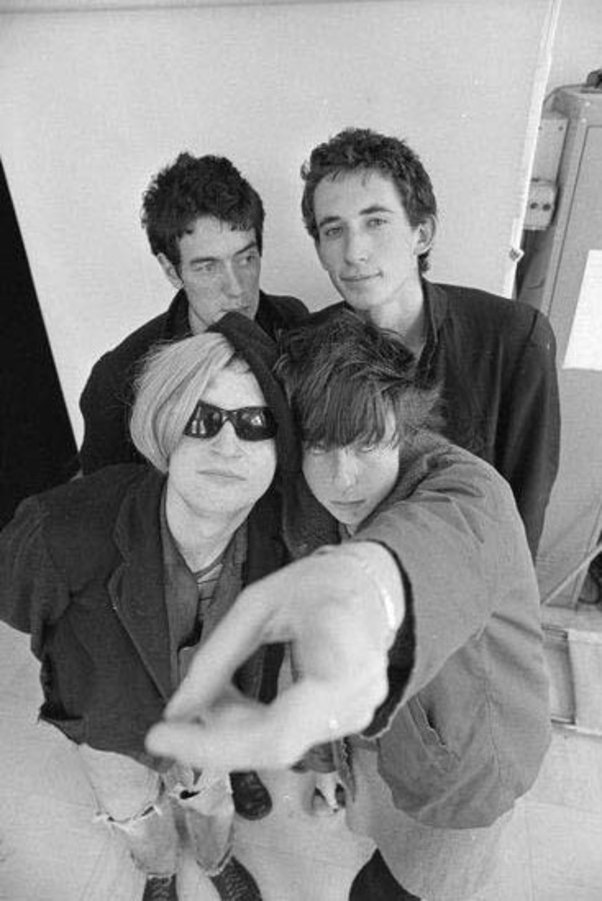The idea? Every day in May, to mark NZ Music Month and 38 years of his own rancid opining and reportage, Gary Steel will present something from his considerable behind. Personal archive, that is. The following piece appeared in the Sunday Star Times, November 30, 1997.
BODY BLOWS
The smash hit album Body Blow made Headless Chickens one of our all-time most successful groups. Six years later, we finally get a follow-up. Singer and sole surviving chook Chris Matthews talks to Gary Steel.
 THE INQUISITOR HAS arrived. A yawning, nonchalant Chris Matthews manages a desultory greeting at his modest Grey Lynn, Auckland flat, and the grilling begins.
THE INQUISITOR HAS arrived. A yawning, nonchalant Chris Matthews manages a desultory greeting at his modest Grey Lynn, Auckland flat, and the grilling begins.
Where do you start with a group such as the Headless Chickens? Rising from the frenzied gothic ashes of Children’s Hour in 1985; establishing themselves as new Zealand’s leading experimental rock group; weathering the suicide of one band member and constant defections; winning a dubious corporate rock award that financed their first album but resulted in a flurry of industry hatred for those unlikable outsiders; going disco with singer Fiona McDonald and cranking out hit songs; touring the UK and getting their material remixed; everything falling slowly askew and asunder… through it all the singular (some would say morose) vision of the Headless Chickens has been that of songwriter, singer and guitarist Matthews, whose distinctive singing style sounds like a gothic warning of bad portent.
There’s been a long, unrestful gap between their most successful record, Body Blow (1991), and Matthews is the only Chicken left from the previous incarnation. It must have been a frustrating process, and that frustration is revealed with lashings of anger and venom on the rage-charged new album Greedy, a record which throws off those dance leanings like spastic impediments and gets right down to the nasty guitar business, and Matthews’ most personal lyrics to date.
He’s got something to say on Greedy, and it’s going to do nothing to destroy his reputation as the most miserable man in Kiwi rock. I tell Matthews an observation made by a colleague some years ago: ‘The music is inherently doom-laden, and a reflection of Matthews’ miserable personality.’
It’s true, perhaps, that Matthews is not the most immediately endearing of personalities, but even in the few minutes I’ve been chatting with him, he’s smiling, laughing, and telling me he knows hundreds of “drummer jokes.”
“I do have the ability to be cheerful occasionally”, says Matthews, “but when you’re writing lyrics, it’s a solitary thing. You’re by yourself, and when you’re by yourself, your state of mind is different.
“I suppose the music does tend towards the grim side, and yeah, I do tend towards melancholy and depression. I don’t know why, I’ve done a bit of counselling and stuff, but it still doesn’t tell you why you are the way you are. I’ve tried Prozac, but it was horrible. It was just weird. I can’t really explain, but I felt like I was turning into someone else. It’s become the Valium of the ‘90s; it gets prescribed for any damn thing that people have wrong with them.
 “Depression is a difficult thing, because if you suffer from it, the depression becomes reality. If you’re in a serious state of depression for a long period of time, there isn’t anything else. That’s your existence. So you tend to look at people who are happy and go, ‘Oh yeah you bastards!’”
“Depression is a difficult thing, because if you suffer from it, the depression becomes reality. If you’re in a serious state of depression for a long period of time, there isn’t anything else. That’s your existence. So you tend to look at people who are happy and go, ‘Oh yeah you bastards!’”
Matthews likes to think, however, that his worldview reflects a passion, pathos, and a dry sense of humour that people often fail to pick up on. One of his heroes is “laughing” Leonard Cohen, another songwriter often accused of wayward miserabilism, but really a great humourist:
“I think that Cohen is very funny. He’s obviously got a great sense of humour, and there are some really quite smart one-liners in his music. I read this wonderful quote by Cohen where he was talking about the fact that it’s not acceptable for people as they get older to be angst-ridden. People think it’s a teenage thing you should grow out of. He said as you get older you get lonelier, and as you get lonelier you need a deeper love to counteract that. And I think it’s true. I think often depression is a reflection of a state of mind that tends to think about things in more depth, because you can see the sadness and futility to a lot of things.”
Regardless, the Headless Chickens’ oeuvre is one of the most distinctively original recorded legacies to come from these shores, and Matthews’ elemental but strikingly forged lyrics stand up as some of our best.
“I just really like wordplay that engages your brain a little bit,” says Matthews. “Elvis Costello is the master of the classic couplet: ‘I call you up just to put you down’. That’s just beautiful! I love words, and appreciate people who twist them to make it interesting. It’s very easy to write ‘Baby, I love you’, although I have to admit I have used the word ‘baby.’ For years I wouldn’t do it, because I thought it was this clichéd thing, but in a rock’n’roll context, it works really well. I don’t think I’ve ever called a woman ‘baby’ in my life, but it does actually work well in the context of music. I don’t know why.”
The Headless Chickens came about in 1985 when Matthews started collaborating with Michael Lawry. “He was a real electronics freak, the first person I met who owned his own four-track (tape recorder) outside of Chris Knox, and his total thing was recording horrible noises, mucking around with sound, purely for its own sake. A lot of it was just me writing songs and him sticking noises on it.”
According to Matthews, this union was the creative basis of the Headless Chickens – the Fiona McDonald hit making edition lasted only three years – and Lawry’s decision to leave caused the biggest ruction.
“Michael’s tastes had changed completely from mine. He always had really eclectic taste in music, and mine was more from a rock and pop perspective. Unfortunately, it got to the point where we couldn’t reconcile the gap between the two of them anymore.”
 Subsequently, there have been many comings and goings. Matthews says McDonald – who some say added a much-needed light to Matthews’ shade – left because “she was finding it difficult because we’d been in a relationship and split up.” Other recent inductees realised they had too many business commitments to devote their full attention to the group.
Subsequently, there have been many comings and goings. Matthews says McDonald – who some say added a much-needed light to Matthews’ shade – left because “she was finding it difficult because we’d been in a relationship and split up.” Other recent inductees realised they had too many business commitments to devote their full attention to the group.
Greedy is out tomorrow, more than a year after recording finished, and it’s the result of several versions of the Headless Chickens. Bassist Bevan Larsen was involved in some tracks, but new recruits Flex (samples) and Gerard Presland (drums) don’t feature.
With the Headless Chickens in such a state of flux during the recording, it seemed likely that Greedy would lack the focus and intensity of prime, well-cooked chook. Surprisingly, it’s the leanest, most eloquent bunch of songs to have come from Matthews’ slightly jaundiced mind. There are remnants of previous incarnations – the hit single ‘George’ – but overall, it’s a back-to-basics rock album in which the fundamentals of songwriting take pride of place.
“I’ve always been a fan of classic songwriting and basically windswept corny songs,” says Matthews. “I used to piss people off in Children’s Hour by playing Glen Campbell records really loud, and I love Simon and Garfunkel.
 “I saw Head Like A Hole on TV saying ‘When we started we couldn’t play, but now that we can we’re writing proper songs’. It’s funny, but it’s true.
“I saw Head Like A Hole on TV saying ‘When we started we couldn’t play, but now that we can we’re writing proper songs’. It’s funny, but it’s true.
“I can play stuff that I could never play before, and my vocal range has improved.
“I’m not experimenting in terms of ‘How can we deconstruct this and make this unlistenable for most of the listeners?’ but ‘How can we put something together that’s different from what we’ve done before?’”
Building, not tearing down. A new life for the Headless Chickens.
Notes: Reading this again makes me feel a bit nauseous, not because of the subject matter but because as a writer, and observer, I feel I really wasn’t on my game. It happens sometimes. I was busy, tired and poor from running my little experimental record store, and really wanted to interview Matthews, because he’s an interesting, intelligent and perceptive bloke. But somehow, our interview didn’t really go off, I didn’t ask the right questions, and wrote the wrong story. Having said that, some of Matthews’ quotes are great.














